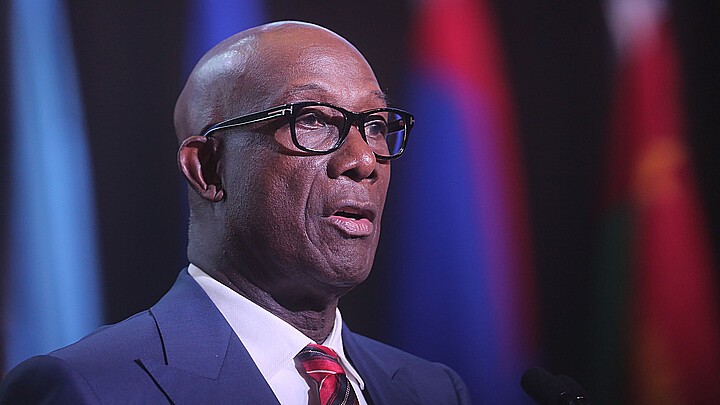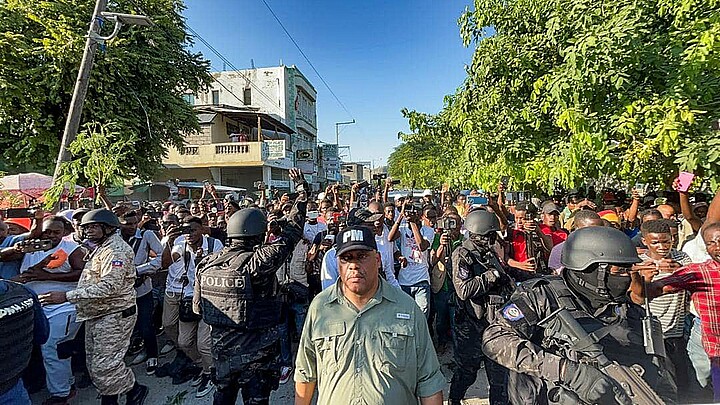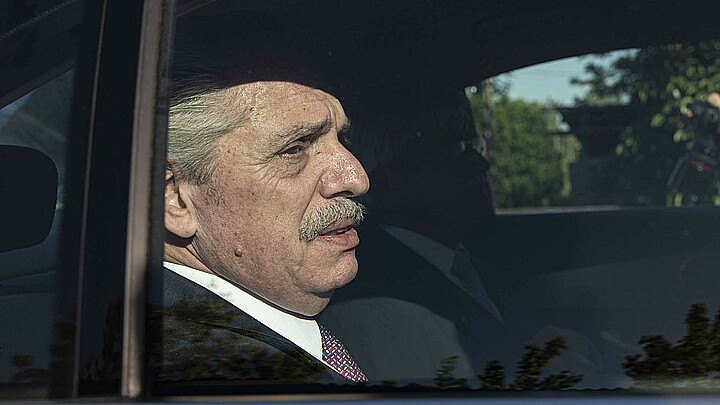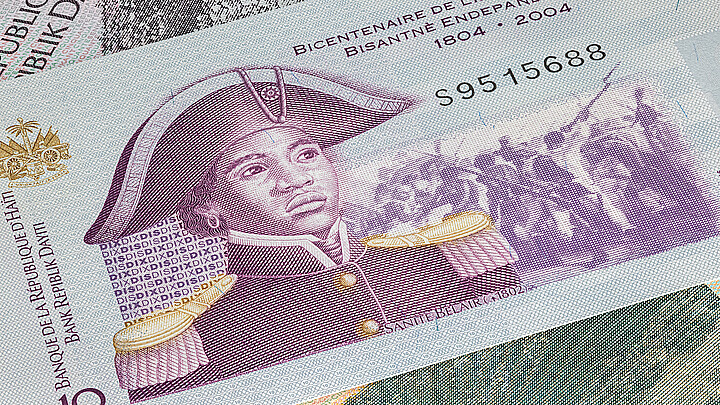Crime
U.S. considers sending troops to Haiti to quell violence as gangs vow to 'break the system'
In one attack, the gangs were able to release more than 4,000 inmates, unleashing an army of hardened criminals into the civilian population of the embattled Caribbean country
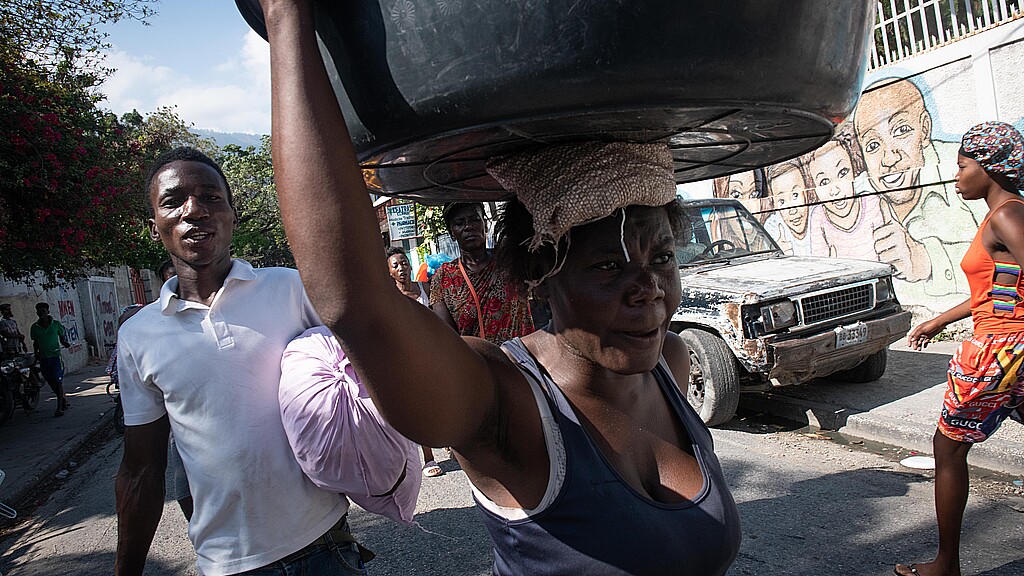
March 9, 2024 9:00pm
Updated: March 11, 2024 9:13am
The U.S. State Department is requesting that the Marine Corps deploy a security team to Haiti to help quell gang violence that is erupting across the nation’s capital, Port Au Prince, according to a defense official who spoke to the Marine Times military newspaper.
“Deploying a FAST [fleet antiterrorism security teams] platoon is one option at the DoD’s disposal should the DoS request assistance with security at the U.S. Embassy in Port Au Prince,” Maj. Mason Englehart, a Corps spokesman for Marine Corps Forces South, told the Times on Friday.
The Corps’ FAST teams, which are trained in noncombatant evacuation operations and “rapid worldwide deployments to provide security to vital national assets,” are usually deployed for limited periods of time to recover U.S. assets.
The teams were sent to Haiti in 2010 to guard the Port-au-Prince based U.S. embassy after the island was struck by an earthquake.
As gang’s have continued to occupy the city and take control of infrastructure including schools, and hospitals, even an international airport, Haitian Prime Minister Ariel Henry is barely clinging to power.
In one attack, the gangs were able to release more than 4,000 inmates, unleashing an army of hardened criminals into the civilian population of the embattled Caribbean country.
Henry left Haiti last week to attend a meeting of the Caribbean Community (CARICOM), an intergovernmental union of Caribbean leaders, and then traveled to Kenya to request international police assistance help reestablish order in his home country.
But when he tried to return, airport restrictions effectively locked him out of Port Au Prince.
Instead, the Haitian president was forced to fly into Puerto Rico after he was denied the opportunity to land in the Dominican Republic, which has restricted airspace from Haiti.
Last year, more than 8,400 people were injured, kidnapped or killed in the island nation, twice the number of 2022. According to the United Nations, about half of Haiti’s 11 million people need humanitarian assistance.
Sadly, the impoverished country has only received $17 million, about 2.5% of estimated $674 million it needs.
As the violence and chaos continues, the U.S. Embassy in Haiti advised all Americans to leave, and warned that it was not able to help them find private charter jet flights amid its reduction in operations.
“U.S. citizens in Haiti should depart Haiti as soon as possible by commercial or other privately available transportation options, in light of the current security situation and infrastructure challenges,” the embassy wrote.
“At this time, the U.S. Embassy is not able to facilitate air travel for private citizens … We also recommend consulting with commercial carriers who operate flights into and out of Haiti, and travel agencies. Private carriers and many travel agencies provide timely information on available options to depart the country.”
White House press secretary Karine Jean-Pierre told reporters on Wednesday that the U.S. has no immediate plans to send troops, but is not “pushing the prime minister to resign” despite rumors.
“We have underscored that now is the time to finalize a political accord to help set Haiti on a path to a better future, and that is something that we’ve been working on for some time,” she said. “We’ve been working that — on that with the CARICOM — so that is nothing new.
“We’ve had those conversations — and also the Haitian partners on the path to restoring democratic order in Haiti through free and fair elections, inclusive governance, and power-sharing. This will give the people an opportunity to democratically elect their prime minister.”
She added that while the U.S. was not immediately sending military forces to Haiti, Kenya had agreed to send police officers there on a security mission.
“So, that was recently signed, and that’s going to move forward,” she said. “But there is no plan to bring U.S. forces into Haiti.”
The last time the U.S. sent military forces to Haiti was in 2021 when President Biden sent the Marine Marine Security Guard Security Augmentation Unit to the Port-Au-Prince embassy “out of an abundance of caution” after Moïse was assassinated.
While Jean-Pierre said there were no immediate plans to send Marines back to the island, the State Department spokesperson was determined to return Americans safely back home.
“We have no higher priority than the safety and security of U.S. citizens overseas,” a U.S. State Dept. spokesperson told Fox News Digital it was a priority to get Americans home safely.
“We are constantly monitoring the political and security situation and will take steps as circumstances warrant,” the State Dept. told FOX.
Henry assumed power in 2021 after his predecessor, Claude Joseph, stepped down as acting president in the wake of Moïse’s assassination.
Since then, elections have been suspended as a result of the chaos and violence, and CARICOM leaders have aimed to set a deadline in 2025.
Gang leaders have said outright their objective is to destroy the government of Haiti.
Former police officer turned gang leader Jimmy Chérizier has repeatedly warned that Henry will not be allowed to return to the country and added that, “our goal is to break the system. We are fighting against Ariel with the last drop of our blood.”
Last year, ADN reported that crime was skyrocketing and that according to the FBI and human rights groups, kidnappings had escalated 300%, and were extorting families by threatening to torture their loved ones.
“Gangs use extreme violence (all forms of torture) to force parents and families to pay large sums of U.S. money that they do not have,” according to the CARDH human rights group.
The group said victims were experiencing severe burns, gang rapes, and hangings as a consequence of their families not paying the ransoms.


